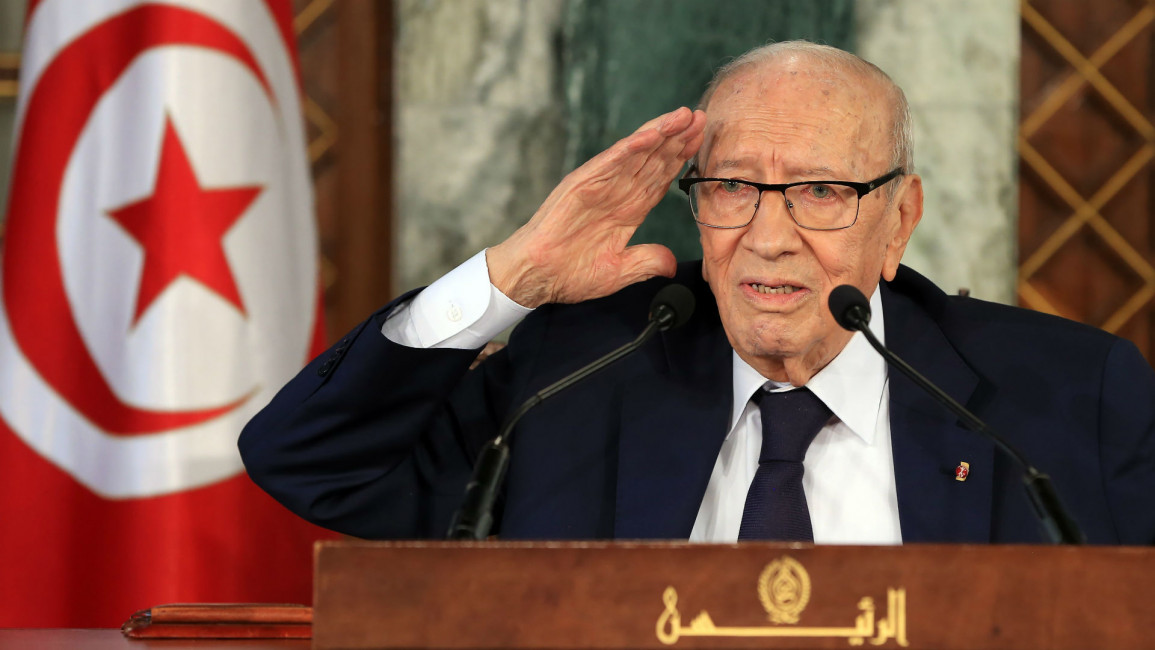No 'power vacuum' in Tunisia despite president's death rumours: advisor
Essebsi, 92, was taken to hospital for a "serious illness" on Thursday, the same day that twin suicide attacks claimed by the Islamic State group killed a police officer in Tunis and wounded several other people.
"We have a president. There is no constitutional vacancy," one of his key advisors, Noureddine Ben Ticha, told the Express FM radio station.
He said the president's condition was "unchanged".
The Tunisian constitution, adopted three years after the 2011 Arab Spring uprising that toppled longtime dictator Zine El Abidine Ben Ali, provides two measures in the case of a power vacuum.
The prime minister can take over the president's responsibilities for a period of no more than 60 days, or if the vacancy is longer the speaker of parliament is tasked with the role for up to 90 days.
In both cases the decision must be taken by the constitutional court after it validates the president's incapacity.
But eight years after the Arab Spring, Tunisia has yet to set up a constitutional court.
On Thursday parliament speaker Mohammed Ennaceur, 85, held a meeting with the heads of parties following the twin suicide bombings and Essebsi's illness.
After his hospitalisation, another key advisor Firas Guefrech had described the president as in "critical condition", and in a later tweet said Essebsi was “stable".
News outlets soon reported incorrect information claiming the president had died, prompting the presidency to publicly deny the rumours.
Late on Thursday, the president's son, Hafedh Caid Essebsi, said there were "the beginnings of an improvement" in his father's condition.
Prime Minister Youssef Chahed said on Facebook he had paid a visit to the ailing leader.
"I would like to reassure Tunisians that the president is receiving the necessary care," he said, warning people not to spread "false and confusing information" after several media reported Essebsi's death.
The country's first democratically elected president, Essebsi came to power in 2014, three years after the Arab Spring that sparked revolts and regime changes in several countries in the region.
'Open door to the youth'
In April, Essebsi announced he would not stand for re-election in the November polls, to make way for someone younger.
"In all honesty, I don't think I will put myself forward," Essebsi told the Nidaa Tounes party which he founded in 2012.
He added that it was time "to open the door to the youth".
His speech before thousands of members at the party's congress came several days after Abdelaziz Bouteflika, the 82-year-old ailing leader of neighbouring Algeria, resigned in the face of huge protests ending two decades in power.
Essebsi however urged his party to overcome bitter internal divisions and to bring Prime Minister Youssef Chahed back into the fold.
Tensions have flared between Chahed and Essebsi's son, Hafedh Caid Essebsi, leading to the premier being sidelined from Nidaa Tounes and forming his own rival party, Tahia Tounes.
Essebsi's secularist Nidaa Tounes won the 2014 elections and formed a coalition with the Islamist Ennahdha party that lasted four years before the two parties split.
Presidential elections are due on November 17, after parliamentary elections which have been scheduled for 6 October.
Tunisia, whose 2011 revolt toppled longtime dictator Zine El Abidine Ben Ali and sparked the Arab Spring uprisings, has been hailed as a model of democratisation in the Arab world, but has faced economic woes and jihadi attacks.
Follow us on Twitter: @The_NewArab



